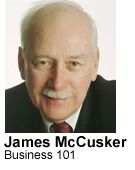 |
Published September 2004
From beginning to end, hiring is a tough job
 Despite
the fact that the economy has hit a “soft patch,” as Federal Reserve Chairman
Alan Greenspan describes it, improving economic conditions mean that businesses
will be looking to hire additional people to help with the growing workload.
The question is: What kind of people should a business hire?
Despite
the fact that the economy has hit a “soft patch,” as Federal Reserve Chairman
Alan Greenspan describes it, improving economic conditions mean that businesses
will be looking to hire additional people to help with the growing workload.
The question is: What kind of people should a business hire?
In today’s competitive environment, selecting the right people often can, and often will, make the difference between a successful business and one that lurches from one crisis to another. But it is not an easy process.
For smaller businesses, one of the problems in hiring the right person comes at the very beginning: describing the job. It’s not that jobs in smaller businesses are more difficult, though they sometimes are, but that they tend to be less well defined. Smaller businesses are inherently unstable, and workers as well as managers must frequently confront new tasks and challenges.
What most smaller businesses need, then, rather than a detailed job description, is one that focuses on more general goals and leaves the specifics to the core skills and experience levels that are needed to perform the job effectively.
The remaining attributes necessary to succeed in your particular business environment — energy, dependability, adaptability, character, etc. — have to be deduced from resumes, recommendations, interviews and, in some cases, tests.
Work in smaller businesses can often be more demanding in terms of skill levels than large corporations. In a big company, for example, an accounts receivable specialist can often be very effective at his or her job with math skills that do not go beyond basic arithmetic. In a smaller business, though, an accounts receivable person would routinely be called on to assist with marketing studies involving customer analysis, which could require familiarity with algebra and statistical inference.
The general issues of skills and adaptability raise an important question for managers with a job opening. Do you accept a candidate’s resume as evidence of skills or do you test them yourself?
The difficulties that our education system have had in teaching basic skills effectively have led to reforms and renewed efforts in that area. But there is still a general skepticism on the part of employers about the skills that can be assumed because a candidate holds a high school diploma. This skepticism, along with the increasing demands of today’s workplace, has resulted in a substantial increase in the testing of potential employees.
If the decision is made to test, it is important that the tests themselves relate to the job and are not simply measuring academic achievement or IQ. The U.S. Supreme Court, in Griggs vs. Duke Power Co., a class-action case filed under the 1964 Civil Rights Act, made this clear when it ruled that the employer has the burden of showing that selection requirements, including tests, “… must have a manifest relationship to the employment in question.” And, further, the court ruled that “… good intent or absence of discriminatory intent does not redeem employment procedures or testing mechanisms that operate as ‘built in headwinds’ for minority groups and are unrelated to measuring job capability.”
One of the best solutions for smaller businesses that want not only to get the best workers but also to stay out of legal trouble is to use a practical example as a test. After you have screened your candidates down to a reasonable number, have one or two of your more experienced workers take some time to show the candidate what is involved with the job, lay out a task and see how he or she handles it. After the test, have your workers immediately write down their impressions and scores. This will give you a look at both the candidate’s aptitude and his or her attitude.
Good managers will realize that there is no magic test that will select the “right” worker without fail. But if you combine the test results with your instincts and the assessments of your best workers and add the candidate’s academic record and experience, you are likely to make good choices.
James McCusker, a Bothell economist, educator and small-business consultant, writes “Your Business” in The Herald each Sunday. He can be reached by sending e-mail to otisrep@aol.com.
The
Marketplace
Heraldnet
The
Enterprise
Traffic
Update
Government/Biz Groups
© 2004 The Daily Herald Co., Everett, WA
